小学英语基本知识点汇总
小学英语知识点汇总(极力推荐)
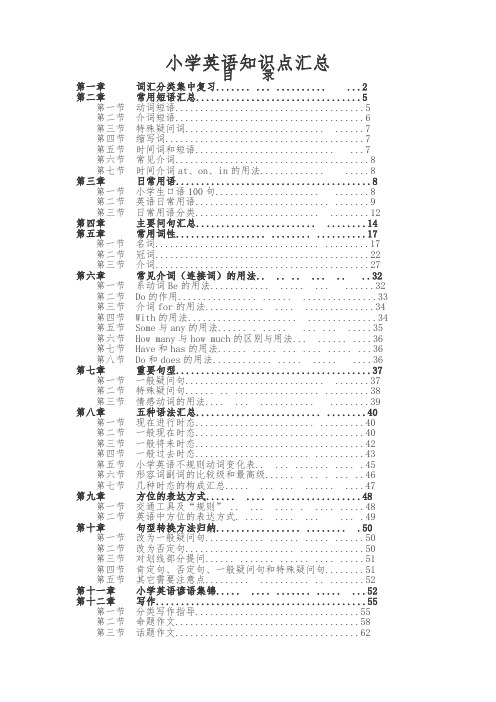
小学英语知识点汇总目录第一章词汇分类集中复习....... ... .......... (2)第二章常用短语汇总 (5)第一节动词短语 (5)第二节介词短语 (6)第三节特殊疑问词............................ (7)第四节缩写词 (7)第五节时间词和短语............................ (7)第六节常见介词 (8)第七节时间介词at、on、in的用法............. .. (8)第三章日常用语 (8)第一节小学生口语100句..................... . (8)第二节英语日常用语........................... . (9)第三节日常用语分类......................... .. (12)第四章主要问句汇总........................ .. (14)第五章常用词性.................. ........ . (17)第一节名词................................. (17)第二节冠词 (22)第三节介词 (27)第六章常见介词(连接词)的用法.. .. .. ... .. ..32 第一节系动词Be的用法............ ..... ... (32)第二节 Do的作用................ ...... (33)第三节介词for的用法............ .... .. (34)第四节 With的用法...................... .. (34)第五节 Some与any的用法...... . ..... ... ... .. (35)第六节 How many与how much的区别与用法... ...... . (36)第七节 Have和has的用法...... ..... ... .... ..... (36)第八节 Do和does的用法............ ..... ..... . (36)第七章重要句型 (37)第一节一般疑问句............................ . (37)第二节特殊疑问句...... .. ................. (38)第三节情感动词的用法.... ... ........... .. (39)第八章五种语法汇总......................... .. (40)第一节现在进行时态........................ (40)第二节一般现在时态 (40)第三节一般将来时态 (42)第四节一般过去时态....................... . (43)第五节小学英语不规则动词变化表.. ... ....... .... .45第六节形容词副词的比较级和最高级...... . .. . ... ..46第七节几种时态的构成汇总..... ... ... ...... . (47)第九章方位的表达方式...... .... (48)第一节交通工具及“规则” .. ... .... . .... .. (48)第二节英语中方位的表达方式. .... .... ... ... .49第十章句型转换方法归纳................. ........ .50 第一节改为一般疑问句............ ...... ..... (50)第二节改为否定句...................... . (50)第三节对划线部分提问...... ....... ...... .... .. (51)第四节肯定句、否定句、一般疑问句和特殊疑问句 (51)第五节其它需要注意点......... .......... .. . (52)第十一章小学英语谚语集锦..... .... ....... ..... (52)第十二章写作 (55)第一节分类写作指导 (55)第二节命题作文 (58)第三节话题作文 (62)小学英语知识点汇总第一章词汇分类集中复习一、学习用品pen钢笔 pencil铅笔 pencil-case铅笔盒 ruler尺子 eraser橡皮 comic book 漫画书 schoolbag书包 crayon蜡笔 Chinese book语文书 notebook笔记本 dictionary词典 bag包magazine杂志 story-book故事书 newspaper报纸 sharpener卷 post card明信片English book英语书 math book数学书book书二、人体foot脚 head头 face脸 hair头发 nose鼻子 finger手指 leg腿 tail 尾巴 mouth嘴 eye眼睛 ear耳朵 arm手臂 hand手三、颜色red红blue蓝yellow黄green绿white白 pink粉红purple紫orange 橙 brown 棕 black黑四、动物cat猫dog狗 pig猪duck鸭 rabbit兔 horse马elephant大象fish鱼bird鸟eagle鹰snake蛇 mouse老鼠ant蚂蚁 beaver海狸bear熊 donkey 驴 goose鹅 deer鹿 monkey猴 goat山羊 squirrel松鼠 panda熊猫 lion狮子 tiger老虎 fox狐狸 zebra斑马 hen母鸡 giraffe长颈鹿turkey火鸡 lamb 小羊sheep绵羊cow奶牛 squid鱿鱼lobster龙虾 shark鲨鱼seal海豹sperm whale抹香鲸 killer whale虎鲸 kangaroo袋鼠五、人物friend朋友 boy男孩girl女孩 mother母亲 father父亲 sister姐妹brother兄弟man男人uncle叔叔;舅舅 woman女人Mr.先生 Miss小姐 lady女士;小姐 mom妈妈 dad爸爸 parents父母 son儿子 daughter女儿 kid小孩 baby婴儿 grandparents祖父母 grandma/grandmother(外)祖母 robot机器人 grandpa/grandfather(外)祖父 visitor参观者aunt姑姑 cousin 堂(表)兄弟;堂(表)姐妹classmate同学queen女王 neighbour邻居 tourist 旅行者 principal校长people人物university student大学生 pen pal笔友六、职业teacher教师student学生doctor医生 nurse护士 driver司机farmer农民singer歌唱家writer作家actor男演员actress女演员artist画家engineer工程师accountant会计 cleaner清洁工 salesperson销售员baseball player棒球运动员assistant售货员police警察policeman(男)警察policewoman(女)警察 TV reporter电视台记者 weather reporter天气预报七、食品、饮料rice米饭 bread面包 beef牛肉 milk牛奶 water水egg蛋 fish鱼 tofu 豆腐cake蛋糕 cookie曲奇 biscuit饼干 jam果酱noodles面条 tea茶meat肉 chicken鸡肉 pork猪肉 salad沙拉soup汤Coke可乐 mutton羊肉 ice冰 ice-cream冰淇淋 juice果汁 coffee咖啡 breakfast早餐 lunch午餐 dinner/supper晚餐 meal一餐 hot dog热狗 hamburger汉堡包French fries炸薯条vegetable蔬菜八、水果、蔬菜apple苹果banana香蕉pear梨orange橙子 grape葡萄eggplant茄子green beans青豆tomato西红柿 potato土豆peach桃 strawberry草莓cucumber黄瓜onion洋葱carrot胡萝卜 cabbage卷心菜 watermelon西瓜九、衣服jacket夹克衫pants长裤 skirt短裙子 dress连衣裙 socks袜子 jeans牛仔裤T-shirt丅恤衫shirt衬衫shoes鞋子sweater毛衣coat上衣raincoat雨衣shorts短裤sneakers网球鞋 slippers拖鞋 sandals凉鞋 boots 靴子hat(有沿的)帽子 cap便帽 cloth布 sunglasses太阳镜tie领带scarf围巾gloves手套 trousers裤子 clothes 衣服十、交通工具bike自行车 bus公共汽车train火车jeep吉普车ship轮船 yacht快艇motor cycle摩托车boat小船 car小汽车taxi出租车van小货车plane/airplane飞机subway/underground地铁十一、杂物window窗户door门desk课桌chair椅子computer计算机board写字板 fan风扇light灯teacher’s desk讲台picture图画;照片wall墙壁 floor地板curtain窗帘 trash bin垃圾箱 closet壁橱 mirror镜子 end table床头柜present礼物 walkman随身听 lamp台灯 sofa沙发 football/soccer足球phone电话shelf书架fridge冰箱bed床table桌子TV电视air-conditioner空调 key钥匙 lock锁 photo照片 chart图表 plate盘子knife刀 fork叉 spoon勺子 chopsticks筷子pot锅 gift礼物 toy玩具doll洋娃娃 ball球balloon气球 kite风筝jigsaw puzzle拼图游戏 box盒子umbrella伞 zipper拉链 violin小提琴 tube管子yo-yo溜溜球 nest鸟窝 hole洞 toothbrush牙刷menu菜单 e-card电子卡片money钱e-mail电子邮件 traffic light交通灯 medicine药十二、地点home家room房间 bedroom卧室 bathroom卫生间living room起居室kitchen 厨房 classroom教室school学校 park公园 library图书馆post office邮局 police office警察局hospital医院cinema电影院bookstore书店farm农场 zoo动物园garden花园study书房playground操场canteen食堂teacher’s office教师办公室library图书馆gym体育馆flat公寓washroom卫生间 art room绘画教室 computer room计算机教室music room音乐教室city城市 TV room电视机房company公司 factory工厂 fruit stand水果摊 pet shop宠物商店 nature park自然公园theme park主题公园 science museum科学博物馆 the Great Wall长城supermarket超市 bank银行 country国家 village 乡村 hometown家乡 bus stop公交车站十三、课程sports体育运动 science科学 Moral Education 思想品德课 Social Studies社会课 Chinese语文 math数学 PE体育课 English英语课十四、国家、城市China/PRC中国 America/USA美国UK联合王国 England英国 Canada/CAN加拿大 Australia澳大利亚New York纽约 London伦敦Sydney悉尼 Moscow莫斯科 Cairo开罗十五、气象cold寒冷的 warm温暖的 cool凉爽的 snowy下雪的 sunny晴朗的hot炎热的 rainy下雨的 windy有风的 cloudy多云的 weather report 天气预报十六、景物river河流 lake湖泊 stream河;溪 forest森林 path小道 road公路house房子 rain雨 cloud云 bridge桥building建筑物sun太阳 mountain山sky天空rainbow彩虹 wind风 air空气 moon月亮十七、植物flower花 grass草 tree树 seed种子 sprout苗 plant植物 rose玫瑰 leaf叶子十八、星期Monday星期一 Tuesday星期二 Wednesday星期三 Thursday星期四Friday星期五 Saturday星期六 Sunday星期天 weekend周末十九、患病have a fever发烧 hurt疼痛 have a cold感冒 have a toothache牙疼have a headache头疼 have a sore throat喉咙疼二十、季节spring春summer夏fall/autumn秋winter冬二十一、方位south南north北east东west西left 左边right右边二十二、月份Jan. (January)一月Feb.(February)二月 Mar.(March)三月 April四月May五月June六月 July七月Aug.(August)八月Sept.(September)九月Oct.(October)十月Nov.(November)十一月Dec.(December)十二月二十三、数词one一 two二 three三 four四 five五 six六 seven七eight八 nine 九 ten十 eleven十一 twelve十二 thirteen十三 fourteen十四fifteen十五sixteen十六 seventeen十七eighteen十八 nineteen十九twenty二十thirty三十 forty四十 fifty五十 sixty六十 seventy七十 eighty八十 ninety九十 forty-two四十二 hundred百 one/a hundred and thirty-six一百三十六first第一 second第二 third第三 fourth第四 fifth第五 eighth第八 ninth第九 twelfth第十二 twentieth第二十thirtieth第三十 fortieth第四十 fiftieth第五十 sixtieth第六十 seventieth第七十eightieth第八十ninetieth第九十 fifty-sixth第五十六二十四、形容词(adj)big大的small小的 long长的 tall高的 short短的;矮的 young年轻的old旧的;老的 strong健壮的 thin瘦的active积极活跃的quiet安静的 nice 好看的 kind和蔼亲切的 strict严格的 smart聪明的funny滑稽可笑的tasty好吃的 sweet甜的 salty咸的 sour酸的 fresh新鲜的favourite最喜爱的 clean干净的 tired疲劳的 excited兴奋的angry生气的 happy高兴的 bored无聊的sad忧愁的 taller更高的 shorter更矮的 stronger更强壮的older年龄更大的 younger更年轻的bigger更大的 heavier更重的 longer更长的 thinner更瘦的 smaller更小的good好的 fine好的great很好的 heavy 重的 fat胖的 happy快乐的 new新的 right对的 hungry饥饿的cute逗人喜爱的little小的lovely可爱的beautiful漂亮的 colourful色彩鲜艳的pretty 漂亮的cheap便宜的expensive昂贵的juicy多汁的 tender嫩的 healthy 健康的ill有病的 helpful有帮助的 high高的 easy简单的 proud骄傲的 sick有病的better更好的 higher更高的二十五、介词(prep)in在……里 on在……上;在……时候 under在……下面 near在……的旁边 behind在……后边 next to与……相邻 over在……上面in front of在……前面二十六、代词(pron)I我 we我们 you你;你们 he他 she她 it它 they他(她,它)们my我的our 我们的 your你的;你们的 his他的 her 她的二十七、动词(v)play(.ed)玩;踢 swim(swam)游泳 kate滑冰fly(flew)飞 jump跳 walk走run(ran)跑 climb爬fight(fought)打架 swing(swung)荡eat(ate)吃sleep(slept)睡觉like像,喜欢turn转弯have(had)有;吃 buy(bought)买take(took)买;带 live居住 teach(taught)教go(went)去study(studied)学习learn学习(learned) sing(sang)唱歌 dance跳舞 row划 do(did)做do homework做作业 do housework做家务 watch TV看电视 read(read) books 读书 cook the meals做饭water the flowers浇花 sweep(swept) the floor扫地 clean the bedroom打扫卧室 make(made) the bed铺床 set(set) the table摆饭桌 wash the clothes洗衣服 do the dishes洗碗碟 use a computer使用计算机go to school上学 eat breakfast吃早饭eat dinner吃晚饭do morning exercises晨练;做广播操 have English class上英语课 play sports进行体育运动 get(got)up起床 climb mountains爬山 go shopping买东西 play the piano弹钢琴 visit grandparents看望(外)祖父母 go hiking去远足 fly kites放风筝 make a snowman堆雪人 plant trees种树draw(drew) pictures画画 cook dinner做饭 read a book看书play chess下棋answer the phone接电话 listen to music听音乐 clean the room打扫房间write(wrote) a letter写信 write an e-mail写电子邮件 drink(drank) water 喝水 take pictures照相 watch insects观察昆虫 pick up leaves采摘树叶 do an experiment做实验 catch butterflies捉蝴蝶 count insects数昆虫collect insects收集昆虫 collect leaves收集树叶 write a report写报告have a picnic举行野餐 get to到达 ride(rode) a bike骑自行车 play the violin拉小提琴 make kites制作风筝collect stamps集邮 meet(met)见面 welcome欢迎 thank谢谢 love爱work工作drink(drank)喝taste尝 smell闻 feed(fed)喂养shear剪 milk挤奶 look看 guess猜 help帮助 pass传递how展示 use使用 clean打扫 open打开close 关上 put放 paint绘画 tell(told)告诉 kick踢 bounce反弹ride(rode)骑stop(stopped)停wait等find(found)寻找到drive(drove)驾驶fold折 send(sent)寄wash洗shine照耀 become变成feel(felt)感觉到 think(thought)思考 meet(met)遇见fall(fell)落下leave(left)离开 wake(woke) up醒来put on穿上take off脱掉hang up挂起wear(wore)穿 go home回家go to bed上床睡觉 play computer games 玩电脑游戏 play chess下棋 empty the trash倒垃圾 put away the clothes收拾衣服 get off下车 take a trip去旅行 read a magazine阅读杂志 go to the cinema去看电影 go straight向前直走第二章常用短语汇总第一次动词短语clean the floor 扫地clean the house 打扫房间collect stamps 集邮come back 回来come from 来自……come here 来这里come in 进来come on 过来/加油come to tea 来喝茶cook the meal 煮饭crash into 撞向dig a hole 挖坑do housework 做家务do morning exercises 晨练do one’s homework 做作业do some reading 读点书do sports 做运动draw a picture 画画drink some water 喝些水drive a car 驾车fall over 跌倒fill the hole with earth 用泥土填坑get off 下车get out of 走出(……之外)go and have a look 去看一看go back 回去go boating 去划船go fishing 去钓鱼go for a walk 去散步go home 回家go on a diet 节食go out 出去go shopping 去购物go sightseeing 去观光go skating 去溜冰go skiing 去滑雪go straight on 直走go swimming 去游泳go to bed 去睡觉go to school 去上学go to the cinema 去看电影go to work 去上班have a bath 洗澡have a Chinese lesson 上语文课have a cold 感冒have a fever 发烧have a good time 玩得开心have a headache 头痛have a look 看一看have a picnic 举行野餐活动工have a rest 休息have a stomachache 胃痛have a tooth-ache 牙痛have a trip 去旅游have a try 试一试have been to 到过have breakfast 吃早餐have fun 玩得开心have lunch 吃午饭have some coke 喝些可乐have supper/dinner 吃晚饭have time 有时间just a minute 等一下just now 刚才keep a diary 记日记let me see 让我想一想/让我看一看listen to music 听音乐listen to the CDs 听CD 碟listen to the radio 听收音机make friends 交朋友make the bed 整理床铺mark the pupils’ homework批改作业next to 下一个no problem 没问题paint a picture 涂画pick up 捡起plant trees 种树play badminton 打羽毛球play basketball 打篮球play cards 打牌play football 踢足球play games 玩游戏play table tennis 打乒乓球play tennis 打网球play the guitar 弹吉他play the piano 弹钢琴put away 放好put on 穿上put the tree into the hole 把树放进洞里ride a bike 骑自行车see a film 看电影surf the Net 上网take a message 传递信息take exercise 进行锻炼take medicine 服药take off 脱下take photos 照相turn off 关闭turn on 打开wait a moment 稍等一下wait for 等候wash clothes 洗衣服wash dishes 洗碟子watch a football match 看足球赛watch TV 看电视water the flower 浇花water the tree 浇树write a letter 写信第二节介词短语a glass of 一杯……a lot of 许多……a map of 一幅……的地图a pair of 一双……a picture of 一幅……的画a plate of 一碟……agree with 同意……all of them 他们大家all of us 我们大家at first 首先at home 在家at last 最后at night 在晚上at school 在学校at the top of 在……顶部at the weeken 在周末be good at 擅长于……be made of 由……制造by the road 在路边by the way 顺便问问close to 靠近……different from 不同于fall down 跌倒far away from 远离from then on 从那时起from…to…从……到……full of 充满get off 下车get on 上车get out of 走出……之外get to 到达go on 继续hand in 上交help…with…帮助某人做某事in English 用英语in front of 在……前面in the afternoon 在下午in the east / south / west /north在东/南/西/北方in the evening 在晚上in the middle 在中间in the morning 在早上in the sky 在空中in time 及时in trouble 遇到麻烦It’s time to 是该……的时候了。
小学英语重点知识点归纳总结

小学英语重点知识点归纳总结一、基本语法1. 语序英语语法中的最基本知识点就是语序。
英语语句的基本语序是:主语+谓语+宾语。
例如:•I eat apples.(我吃苹果。
)•Jack is reading a book.(杰克正在读一本书。
)•They played football in the park.(他们在公园踢足球。
)但是,副词和介词短语在句子中的位置是可以适当变动的,以便表达不同的意思。
例如:•She often sings in the shower.(她经常在淋浴时唱歌。
)•In the park, they played football.(他们在公园里踢足球。
)2. 时态在英语中,时态是表示时间的一种语法形式。
英语时态共有12个,分别是:•简单现在时(Present simple)•现在进行时(Present continuous)•简单过去时(Past simple)•过去进行时(Past continuous)•简单将来时(Future simple)•将来进行时(Future continuous)•现在完成时(Present perfect)•过去完成时(Past perfect)•将来完成时(Future perfect)•现在完成进行时(Present perfect continuous)•过去完成进行时(Past perfect continuous)•将来完成进行时(Future perfect continuous)其中最常用的是简单现在时、现在进行时、简单过去时和现在完成时。
例如:•I play basketball every day.(我每天都打篮球。
)(简单现在时)•She is singing a song now.(她正在唱歌。
)(现在进行时)•They visited the Great Wall last month.(他们上个月参观了长城。
小学英语基础知识点归纳
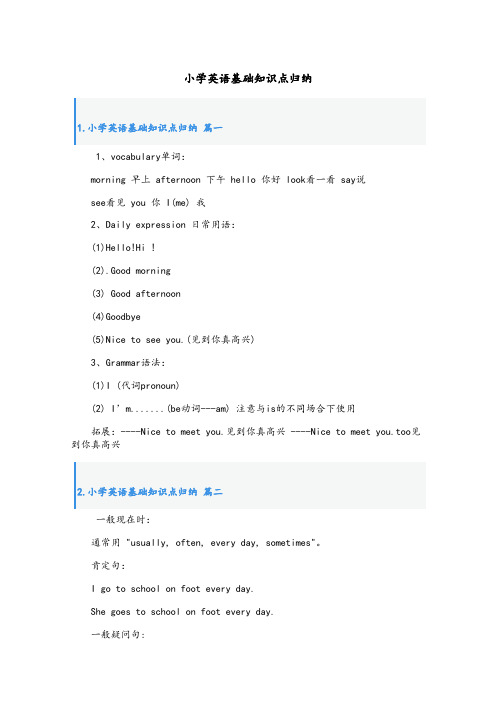
小学英语基础知识点归纳1.小学英语基础知识点归纳篇一1、vocabulary单词:morning 早上 afternoon 下午 hello 你好 look看一看 say说see看见 you 你 I(me) 我2、Daily expression 日常用语:(1)Hello!Hi !(2).Good morning(3) Good afternoon(4)Goodbye(5)Nice to see you.(见到你真高兴)3、Grammar语法:(1)I (代词pronoun)(2) I’m.......(be动词---am) 注意与is的不同场合下使用拓展:----Nice to meet you.见到你真高兴 ----Nice to meet you.too见到你真高兴2.小学英语基础知识点归纳篇二一般现在时:通常用 "usually, often, every day, sometimes"。
肯定句:I go to school on foot every day.She goes to school on foot every day.一般疑问句:Do you jump high? Yes, I do. / No, I don't.Does he jump high? Yes, he does. / No, he doesn't.否定句:We don't go to school on Sundays.My mother doesn't like watching TV in the evening.3.小学英语基础知识点归纳篇三特殊疑问句。
表示疑问,有疑问词(在开头),回答有很多种可能。
常用疑问词:What、When、Which、Who、Whose、Why、How如何对划线部分提问:1、将原问句翻译为汉语(在读中要将划线部分重读)。
如:His birthday is on the 5th of May .他的生日在五月五日。
(完整版)小学英语知识大全
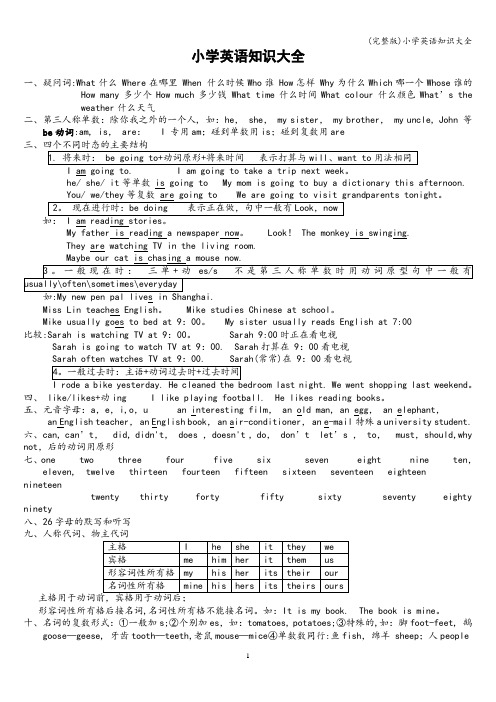
小学英语知识大全一、疑问词:What什么 Where在哪里 When 什么时候Who谁 How怎样 Why为什么Which哪一个Whose谁的How many多少个How much多少钱 What time什么时间What colour什么颜色What’s theweather什么天气二、第三人称单数:除你我之外的一个人, 如:he, she, my sister, my brother, my uncle, John 等be动词:am, is, are: I 专用am;碰到单数用is;碰到复数用areI am going to. I am going to take a trip next weekhe/ she/ it等单数 is going to My mom is going to buy a dictionary this afternoon.。
I am reading storiesMy father is reading a newspaper now。
Look! The monkey is swinging.They are watching TV in the living room.:My new pen pal lives in Shanghai.Miss Lin teaches English。
Mike studies Chinese at school。
Mike usually goes to bed at 9:00。
My sister usually reads English at 7:00比较:Sarah is watching TV at 9:00。
Sarah 9:00时正在看电视Sarah is going to watch TV at 9:00. Sarah打算在 9:00看电视常常)在 9:00看电视。
四、 like/likes+动ing I like playing football. He likes reading books。
小学英语必考知识点总结_小学英语总结
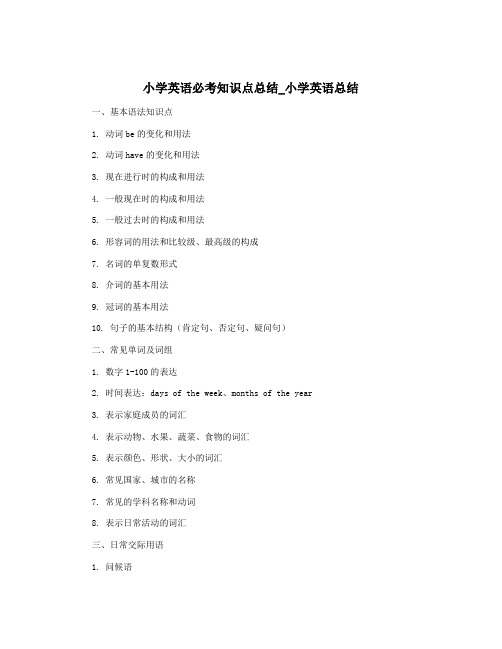
小学英语必考知识点总结_小学英语总结一、基本语法知识点1. 动词be的变化和用法2. 动词have的变化和用法3. 现在进行时的构成和用法4. 一般现在时的构成和用法5. 一般过去时的构成和用法6. 形容词的用法和比较级、最高级的构成7. 名词的单复数形式8. 介词的基本用法9. 冠词的基本用法10. 句子的基本结构(肯定句、否定句、疑问句)二、常见单词及词组1. 数字1-100的表达2. 时间表达:days of the week、months of the year3. 表示家庭成员的词汇4. 表示动物、水果、蔬菜、食物的词汇5. 表示颜色、形状、大小的词汇6. 常见国家、城市的名称7. 常见的学科名称和动词8. 表示日常活动的词汇三、日常交际用语1. 问候语2. 表示喜欢或不喜欢的词汇3. 表示身体部位的词汇4. 表示情感的词汇5. 表示方向的词汇四、常见句型1. What’s this/that? It’s a/an…2. Is this/that a …? Yes, it is. / No, it isn’t.3. What colour is it? It’s…4. How many… are there? There are…5. What’s your/his/her name? My/His/Her name is…6. How old are you? I am … years old.7. Do you like…? Yes, I do. / No, I don’t.8. Where are you from? I am from…五、日常活动1. 描述日常活动的词汇及句子2. 描述日常活动的频率:always、usually、often、sometimes、never3. 表达日常活动所需的动词短语六、常见情景对话1. 自我介绍2. 询问年龄、姓名3. 询问喜欢的食物、颜色等4. 询问材料、颜色5. 询问位置、方向七、常见教学用语1. 教室用语和课堂指令2. 学习用具的名称3. 学习场所和物品的名称八、其他1. 常用生活用语和短语2. 主题相关的歌曲、儿歌和故事3. 形式多样的综合练习题,包括听力、口语、阅读、写作。
(超详)小学英语知识点归纳汇总

(超详)小学英语知识点归纳汇总
1. 语法知识点
- 主谓一致:主语和谓语动词在人称和数上保持一致。
- 形容词和副词的比较级和最高级:用于比较两个或多个事物的形容词和副词的变化形式。
- 名词的单复数:名词变化形式表示单数或复数。
- 时态:表示动作发生的时间,包括现在时、过去时和将来时等。
2. 词汇知识点
- 常用的基础词汇:包括数字、颜色、家庭成员、动物、食物等基本词汇。
- 动词:常用的动词及其过去式和现在分词形式。
- 名词:常见的名词及其单数和复数形式。
- 形容词和副词:用于描述事物的形容词和表示方式的副词。
3. 句型知识点
- 祈使句:用于表达命令、请求或建议的句子。
- 选择疑问句:用于提问时给出的选择项。
- 陈述句:陈述一个事实或描述一个情况的句子。
- 疑问句:用于提出问题的句子。
4. 阅读知识点
- 词义猜测:通过上下文推测词语的意思。
- 主旨理解:理解文章的中心思想或要点。
- 细节理解:理解文章中的具体细节信息。
- 推理判断:根据已有信息推断出未提及的信息。
以上是小学英语的一些基本知识点归纳汇总,希望对您有帮助!。
小学英语知识点最全整理
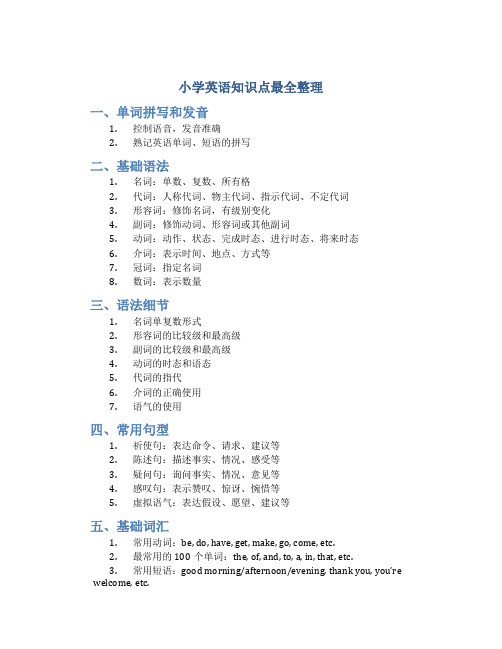
小学英语知识点最全整理一、单词拼写和发音1.控制语音,发音准确2.熟记英语单词、短语的拼写二、基础语法1.名词:单数、复数、所有格2.代词:人称代词、物主代词、指示代词、不定代词3.形容词:修饰名词,有级别变化4.副词:修饰动词、形容词或其他副词5.动词:动作、状态、完成时态、进行时态、将来时态6.介词:表示时间、地点、方式等7.冠词:指定名词8.数词:表示数量三、语法细节1.名词单复数形式2.形容词的比较级和最高级3.副词的比较级和最高级4.动词的时态和语态5.代词的指代6.介词的正确使用7.语气的使用四、常用句型1.祈使句:表达命令、请求、建议等2.陈述句:描述事实、情况、感受等3.疑问句:询问事实、情况、意见等4.感叹句:表示赞叹、惊讶、惋惜等5.虚拟语气:表达假设、愿望、建议等五、基础词汇1.常用动词:be, do, have, get, make, go, come, etc.2.最常用的100个单词:the, of, and, to, a, in, that, etc.3.常用短语:good morning/afternoon/evening, thank you, you’re welcome, etc.六、常用语法规则1.一般现在时:表示经常发生的事情2.一般过去时:表示过去发生的事情3.现在进行时:表示正在进行的动作4.过去进行时:表示过去一段时间正在进行的动作5.现在完成时:表示过去发生的动作对现在造成的影响6.过去完成时:表示过去某个时间之前已经完成的动作7.将来时态:表示将要发生的动作七、学习技巧1.通过听力练习掌握语音、语调和语感2.通过阅读练习掌握词汇、语法和表达方式3.通过口语练习掌握语言的交流和表达能力八、学习资源1.网络课程:国内外各大教育机构提供的英语在线课程2.英语电影和电视剧:通过观看英语影片来提高语感和口语表达能力3.英语音乐:通过欣赏英语歌曲来提高语感和口语表达能力4.英语读物:通过阅读英语小说、新闻和杂志来提高阅读能力和语感学好英语需要我们不断的接触和学习,只有在不断地实践中才能掌握好语言水平。
小学英语知识点汇总(极力推荐)

小学英语知识点汇总第一章词汇分类集中复习一、学习用品pen钢笔pencil铅笔pencil-case铅笔盒ruler尺子eraser橡皮 comic book漫画书 schoolbag书包 crayon 蜡笔 Chinese book语文书 notebook笔记本 dictionary词典bag包magazine杂志 story-book故事书 newspaper报纸sharpener卷 post card明信片二、人体foot脚 head头 face脸 hair头发 nose鼻子 finger手指 leg腿 tail尾巴 mouth嘴 eye眼睛 ear耳朵 arm 手臂 hand手三、颜色red红blue蓝yellow黄green绿white白 pink粉红purple 紫orange 橙 brown棕 black黑四、动物cat猫dog狗 pig猪duck鸭 rabbit兔 horse马elephant 大象fish鱼 bird鸟snake蛇 mouse老鼠ant蚂蚁bear 熊donkey驴goose鹅deer鹿monkey猴goat山羊squirrel松鼠 panda熊猫 lion狮子 tiger老虎 fox狐狸zebra斑马 hen母鸡 giraffe长颈鹿 lamb小羊sheep绵羊cow奶牛kangaroo袋鼠五、人物friend朋友 boy男孩girl女孩 mother母亲 father父亲sister姐妹 brother兄弟man男人uncle叔叔;舅舅 woman 女人Mr.先生 Miss小姐 lady女士;小姐 mom妈妈dad爸爸 parents父母 son儿子 daughter女儿 kid小孩 baby 婴儿 grandparents祖父母 grandma/grandmother(外)祖母 robot机器人 grandpa/grandfather(外)祖父 visitor 参观者aunt姑姑 cousin堂(表)兄弟;堂(表)姐妹classmate 同学queen女王 neighbour邻居 principal校长people人物university student大学生 pen pal笔友六、职业teacher教师student学生doctor医生 nurse护士 driver司机farmer农民 singer歌唱家 writer作家 actor男演员cleaner清洁工baseball player棒球运动员assistant售货员police警察policeman(男)警察policewoman(女)警察weather reporter天气预报七、食品、饮料rice米饭 bread面包 beef牛肉 milk牛奶 water水egg蛋 fish鱼 tofu豆腐cake蛋糕noodles面条 tea茶 meat 肉 chicken鸡肉 pork猪肉 salad沙拉soup汤Coke可乐 mutton羊肉 ice冰 ice-cream冰淇淋 juice果汁 coffee咖啡 breakfast早餐 lunch午餐 dinner/supper晚餐 hot dog热狗 hamburger汉堡包French fries炸薯条vegetable 蔬菜八、水果、蔬菜apple苹果banana香蕉pear梨orange橙子 grape葡萄eggplant茄子green beans青豆tomato西红柿 potato土豆peach桃 strawberry草莓cucumber黄瓜onion洋葱carrot胡萝卜 cabbage卷心菜 watermelon西瓜九、衣服jacket夹克衫pants长裤skirt短裙子dress连衣裙socks袜子 jeans牛仔裤T-shirt丅恤衫 shirt衬衫 shoes鞋子 sweater毛衣 coat上衣 raincoat雨衣shorts短裤sneakers网球鞋 slippers拖鞋 sandals凉鞋 boots靴子hat(有沿的)帽子 cap便帽 cloth布 sunglasses太阳镜gloves手套 trousers裤子 clothes 衣服十、交通工具bike自行车 bus公共汽车train火车jeep吉普车ship轮船 yacht快艇 boat小船 car小汽车taxi出租车van小货车plane/airplane飞机 subway/underground地铁十一、杂物window窗户door门desk课桌chair椅子computer计算机board写字板 fan风扇light灯teacher’s desk讲台picture 图画;照片wall墙壁 floor地板 curtain窗帘 trash bin垃圾箱 closet壁橱 mirror镜子 end table床头柜 present 礼物 walkman随身听 lamp台灯 sofa沙发 football/soccer 足球 phone电话 shelf书架 fridge冰箱bed床 table桌子 TV电视 air-conditioner空调 key钥匙 lock锁 photo照片 chart图表 plate盘子knife刀 fork叉 spoon勺子chopsticks筷子pot锅 gift礼物 toy玩具doll洋娃娃ball球balloon气球 kite风筝jigsaw puzzle拼图游戏 box 盒子umbrella伞 zipper拉链 violin小提琴yo-yo溜溜球nest鸟窝 hole洞 toothbrush牙刷menu菜单 e-card电子卡片money钱e-mail电子邮件 traffic light交通灯十二、地点home家room房间 bedroom卧室 bathroom卫生间living room 起居室kitchen厨房 classroom教室school学校 park公园 library图书馆post office邮局 police office警察局hospital 医院cinema电影院bookstore书店farm农场 zoo动物园garden花园study书房playground操场canteen食堂teacher’s office教师办公室library图书馆gym体育馆flat 公寓washroom卫生间 art room绘画教室 computer room计算机教室music room音乐教室city城市 TV room电视机房company 公司 factory工厂 fruit stand水果摊 pet shop宠物商店 nature park自然公园theme park主题公园 science museum 科学博物馆 the Great Wall长城supermarket超市 bank银行 country国家 village乡村 hometown家乡 bus stop公交车站十三、课程sports体育运动 science科学 Moral Education 思想品德课 Social Studies社会课 Chinese语文 math数学 PE体育课 English英语课十四、国家、城市China/PRC中国 America/USA美国UK联合王国 England英国 Canada/CAN加拿大Australia澳大利亚New York纽约London伦敦Sydney悉尼 Moscow莫斯科 Cairo开罗十五、气象cold寒冷的 warm温暖的 cool凉爽的 snowy下雪的sunny晴朗的hot炎热的 rainy下雨的 windy有风的 cloudy多云的 weather report天气预报十六、景物river河流 lake湖泊 stream河;溪 forest森林 path 小道 road公路house房子 rain雨 cloud云 bridge 桥building建筑物sun太阳 mountain山sky天空rainbow彩虹 wind风 air空气 moon月亮十七、植物flower花 grass草 tree树 seed种子 sprout苗plant植物 rose玫瑰 leaf叶子十八、星期Monday星期一 Tuesday星期二 Wednesday星期三 Thursday 星期四Friday星期五 Saturday星期六 Sunday星期天 weekend 周末十九、患病have a fever发烧 hurt疼痛 have a cold感冒 have a toothache牙疼have a headache头疼二十、季节spring春summer夏fall/autumn秋winter冬二十一、方位south南north北east东west西left 左边right右边二十二、月份Jan. (January)一月Feb.(February)二月 Mar.(March)三月April四月May五月June六月July七月Aug.(August)八月Sept.(September)九月Oct.(October)十月Nov.(November)十一月Dec.(December)十二月二十三、数词one一 two二 three三 four四 five五 six六 seven七eight八 nine九 ten十 eleven十一twelve十二thirteen十三 fourteen十四 fifteen十五sixteen十六seventeen十七eighteen十八 nineteen十九 twenty二十thirty三十 forty四十 fifty五十 sixty六十 seventy 七十 eighty八十 ninety九十hundred百 first第一second第二 third第三 fourth第四 fifth第五eighth第八 ninth第九 twelfth第十二 twentieth第二十thirtieth第三十fortieth第四十fiftieth第五十sixtieth第六十seventieth第七十eightieth第八十ninetieth第九十 fifty-sixth第五十六二十四、形容词big大的small小的 long长的 tall高的 short短的;矮的 young年轻的old旧的;老的 strong健壮的 thin瘦的active积极活跃的quiet安静的 nice好看的 kind和蔼亲切的 strict严格的 smart聪明的funny滑稽可笑的tasty好吃的 sweet甜的 salty咸的 sour酸的 fresh新鲜的favourite 最喜爱的 clean干净的 tired疲劳的angry生气的 happy 高兴的sad忧愁的 good好的 fine好的great很好的heavy 重的 fat胖的 happy快乐的 new新的 right对的hungry饥饿的cute逗人喜爱的little小的lovely可爱的beautiful漂亮的 colourful色彩鲜艳的pretty漂亮的cheap便宜的expensive昂贵的 healthy健康的ill有病的 helpful 有帮助的 high高的 easy简单的 proud骄傲的 sick 有病的better更好的 higher更高的二十五、介词(prep)in在……里 on在……上;在……时候 under在……下面 near在……的旁边 behind在……后边 next to及……相邻 over在……上面 in front of在……前面二十六、代词(pron)I我 we我们 you你;你们 he他 she她 it 它 they他(她,它)们my我的our 我们的 your 你的;你们的 his他的 her她的二十七、动词(v)play(.ed)玩;踢 swim(swam)游泳 kate滑冰fly(flew)飞jump跳 walk走run(ran)跑 climb爬fight(fought)打架swing(swung)荡eat(ate)吃sleep(slept)睡觉like像,喜欢turn转弯have(had)有;吃 buy(bought)买take(took)买;带live居住 teach(taught)教go(went)去study(studied)学习learn学习(learned) sing(sang)唱歌 dance跳舞 row 划 do(did)做do homework做作业 do housework做家务 watch TV看电视 read(read) books读书 cook the meals做饭water the flowers浇花 sweep(swept) the floor扫地 clean the bedroom打扫卧室 make(made) the bed铺床 set(set) the table 摆饭桌 wash the clothes洗衣服 do the dishes洗碗碟 use a computer使用计算机go to school上学 eat breakfast吃早饭eat dinner吃晚饭do morning exercises晨练;做广播操 have English class上英语课 play sports进行体育运动 get(got)up起床 climb mountains爬山 go shopping买东西 play the piano弹钢琴 visit grandparents 看望(外)祖父母 go hiking去远足 fly kites放风筝 make a snowman堆雪人 plant trees种树 draw(drew) pictures画画 cook dinner做饭 read a book看书play chess 下棋answer the phone接电话 listen to music听音乐 clean the room打扫房间write(wrote) a letter写信 write an e-mail写电子邮件 drink(drank) water喝水 take pictures照相 watch insects观察昆虫 pick up leaves采摘树叶do an experiment做实验 catch butterflies捉蝴蝶 count insects数昆虫collect insects收集昆虫 collect leaves收集树叶write a report写报告have a picnic举行野餐 get to到达 ride(rode) a bike骑自行车 play the violin拉小提琴make kites制作风筝collect stamps集邮meet(met)见面 welcome欢迎 thank谢谢 love爱work 工作drink(drank)喝 taste尝help帮助 pass传递use 使用 clean打扫 open打开close关上 put放 paint 绘画tell(told)告诉ride(rode)骑stop(stopped)停wait等 find(found)寻找到 drive(drove)驾驶wash洗 become变成feel(felt)感觉到think(thought)思考meet(met)遇见fall(fell)落下leave(left)离开wake(woke) up 醒来put on穿上take off脱掉hang up挂起wear(wore)穿 go home回家go to bed上床睡觉 play computer games玩电脑游戏 play chess下棋 empty the trash倒垃圾 put away the clothes收拾衣服 get off下车 take a trip去旅行read a magazine阅读杂志 go to the cinema去看电影 go straight向前直走第二章常用短语汇总第一次动词短语clean the floor 扫地clean the house 打扫房间collect stamps 集邮come back 回来come from 来自……come here 来这里come in 进来come on 过来/加油come to tea 来喝茶cook the meal 煮饭crash into 撞向dig a hole 挖坑do housework 做家务do morning exercises 晨练do one’s homework 做作业do some reading 读点书do sports 做运动draw a picture 画画drink some water 喝些水drive a car 驾车fall off 跌倒get off 下车go and have a look 去看一看go back 回去go boating 去划船go fishing 去钓鱼go for a walk 去散步go home 回家go out 出去go shopping 去购物go sightseeing 去观光go skating 去溜冰go skiing 去滑雪go straight on 直走go swimming 去游泳go to bed 去睡觉go to school 去上学go to the cinema 去看电影go to work 去上班have a cold 感冒have a fever 发烧have a good time 玩得开心have a headache 头痛have a look 看一看have a picnic 举行野餐活动工have a rest 休息have a trip 去旅游have a try 试一试have breakfast 吃早餐just a minute 等一下let me see 让我想一想/让我看一看listen to music 听音乐make friends 交朋友make the bed 整理床铺mark the pupils’homework批改作业next to 下一个no problem 没问题pick up 捡起plant trees 种树play basketball 打篮球play football 踢足球play games 玩游戏play table tennis 打乒乓球play tennis 打网球play the guitar 弹吉他play the piano 弹钢琴put away 放好put on 穿上ride a bike 骑自行车see a film 看电影take medicine 服药take off 脱下take photos 照相turn off 关闭turn on 打开wait a moment 稍等一下wash clothes 洗衣服do the dishes 洗碟子第三节特殊疑问词what 什么where 哪里who 谁whose 谁的when 什么时候how 怎样which 哪一个what time 什么时候what colour 什么颜色what language 什么语言what subject 什么科目what class 什么班what day 星期几what date 日期how many 多少how much 多少钱how often 多经常how long 多长时间how old 多大how tall 多高how heavy 多重why 为什么第五节时间词和短语year年month 月week周date日期day 日hour 小时morning 早上afternoon 下午evening 晚上the day beforeyesterday 前天yesterday 昨天today 今天tomorrow 明天the day aftertomorrow 后天last year去年last month 上个月last week 上个星期next year 明年next month 下个月next week 下周第七节时间介词at,on,in的用法1、at 用在具体的时刻和中午前面。
- 1、下载文档前请自行甄别文档内容的完整性,平台不提供额外的编辑、内容补充、找答案等附加服务。
- 2、"仅部分预览"的文档,不可在线预览部分如存在完整性等问题,可反馈申请退款(可完整预览的文档不适用该条件!)。
- 3、如文档侵犯您的权益,请联系客服反馈,我们会尽快为您处理(人工客服工作时间:9:00-18:30)。
个性化教学辅导教案学员姓名:任课教师:所授科目:英语一般疑问句:Be 主语其它。
如:-Are you a student-Yes. I am. / No, I'm not.非凡疑问句:疑问词一般疑问句。
如:Where is my bike2.行为动词的变化。
否定句:主语don't( doesn't ) 动词原形( 其它)。
如:I don't like bread.当主语为第三人称单数时,要用doesn't构成否定句。
如:He doesn't often play.一般疑问句:Do( Does ) 主语动词原形其它。
如:- Do you often play football- Yes, I do. / No, I don't.当主语为第三人称单数时,要用does构成一般疑问句。
如:- Does she go to work by bike- Yes, she does. / No, she doesn't.动词s的变化规则1.一般情况下,直接加-s,如:cook-cooks, milk-milks2.以s. x. sh. ch. o结尾,加-es,如:guess-guesses, wash-washes, watch-watches, go-goes3.以“辅音字母y”结尾,变y为i, 再加-es,如:study-studies用括号内动词的适当形式填空。
1. He often ________(have) dinner at home.2. Daniel and Tommy _______(be) in Class One.3. We _______(not watch) TV on Monday.4. Nick _______(not go) to the zoo on Sunday.5. ______ they ________(like) the World Cup6. What _______they often _______(do) on Saturdays7. _______ your parents _______(read) newspapers every day8. The girl _______(teach) us English on Sundays.9. She and I ________(take) a walk together every evening.10. There ________(be) some water in the bottle.11. Mike _______(like) cooking.12. They _______(have) the same hobby.13. My aunt _______(look) after her baby carefully.14. You always _______(do) your homework well.15. I _______(be) ill. I’m staying in bed.16. She _______(go) to school from Monday to Friday.17. Liu Tao _______(do) not like PE.18. The child often _______(watch) TV in the evening.19. Su Hai and Su Yang _______(have) eight lessons this term.20. -What day _______(be) it today -It’s Saturday三、现在进行时1.现在进行时表示现在正在进行或发生的动作,也可表示当前一段时间内的活动或现阶段正在进行的动作。
2.现在进行时的肯定句基本结构为be+动词ing.3.现在进行时的否定句在be后加not。
4.现在进行时的一般疑问句把be动词调到句首。
5.现在进行时的非凡疑问的基本结构为:疑问词不达意be 主语动词ing但疑问词当主语时其结构为:疑问词不达意be 动词ing动词加ing的变化规则1.一般情况下,直接加ing,如:cook-cooking2.以不发音的e结尾,去e加ing,如:make-making, taste-tasting3.如果末尾是一个元音字母和一个辅音字母,双写末尾的辅音字母,再加ing,如:run-running, stop-stopping写出下列动词的现在分词:play________ run__________ swim _________make__________go_________ like________ write________ _ski___________read________ have_________ sing ________ dance_________put_________ see________ buy _________ love____________live_______ take_________ come ________ get_________stop_________ sit ________ begin________ shop___________二、用所给的动词的正确形式填空:boy __________________ ( draw)a picture now.2. Listen .Some girls _______________ ( sing)in the classroom .3. My mother _________________ ( cook )some nice food now.4. What _____ you ______ ( do ) now5. Look . They _______________( have) an English lesson .____________(not ,water) the flowers now.! the girls ________________(dance )in the classroom .is our granddaughter doing She _________(listen ) to music.9. It’s 5 o’clock now. We _____________(have)supper now(wash )clothes Yes ,she is .四、将来时理论及练习一、概念:表示将要发生的动作或存在的状态及打算、计划或预备做某事。
句中一般有以下时间状语:tomorrow, next day(week, month, year…),soon, the day after tomorrow(后天)等。
二、基本结构:①be going to do;②will do.三、否定句:在be动词(am, is, are)l后加not或情态动词will后加not成won’t。
例如:I’m going to have a picnic this afternoon.→ I’m not going to have a picnic th is afternoon.四、同义句:be going to = willgoing to 表示将要发生的事或打算、计划、决定要做的事情。
2.肯定句:be going to +动词原形,如:Jim is going to play football. 否定句:be not going to +动词原形,如:Jim is not going to play football. 一般疑问句:把be动词调到句首,如:Is Jim going to play football 特殊疑问句:疑问词+be+主语+going to+动词原形如:What is Jim going to do 疑问词当主语时:疑问词+be+going to+动词原形如:Who is going to play footballI am going to go swimming tomorrow(明天). = I will go swimming tomorrow.练习:填空。
1. 我打算明天和朋友去野炊。
I_____ _______ _________ have a picnic with my friends.I ________ have a picnic with my friends.2.我们将要学习英语We _____ _______ _________ learn English.We ________ learn English.五、一般过去时1.一般过去时表示过去某个时间发生的动作或存在的状态,常和表示过去的时间状语连用。
一般过去时也表示过去经常或反复发生的动作感谢。
动词在一般过去时中的变化:⑴am 和is在一般过去时中变为was。
(w as not=wasn’t)⑵are在一般过去时中变为were。
(were not=weren’t)⑶带有was或were的句子,其否定、疑问的变化和is, am, are一样,即否定句在was或were后加not,一般疑问句把was或were调到句首。
3.句中没有be动词的一般过去时的句子否定句:didn’t +动词原形,如:Jim didn’t go home yesterday. 一般疑问句:在句首加did,句子中的动词过去式变回原形。
如:Did Jim go home yesterday 特殊疑问句:⑴疑问词+did+主语+动词原形如:What did Jim do yesterday ⑵疑问词当主语时:疑问词+动词过去式如:Who went to home yesterday动词过去式变化规则:1.一般在动词末尾加-ed,如:pull-pulled, cook-cooked2.结尾是e加d,如:taste-tasted3.末尾只有一个元音字母和一个辅音字母的重读闭音节,应双写末尾的辅音字母,再加-ed,如:stop-stopped4.以“辅音字母+y”结尾的,变y为i,再加-ed,如:study-studied5.不规则动词过去式:am,is-was, are-were, do-did, see-saw, say-said, give-gave, get-got, go-went, come-came, have-had, eat-ate, take-took, run-ran, sing-sang, put-put, make-made, read-read, write-wrote, draw-drew, drink-drank, fly-flew, ride-rode, speak-spoke, sweep-swept, swim-swam, sit-sat过去时练习写出下列动词的过去式is\am_________ plant________ are ________drink_________ play_______ go________ make ________does_________ dance________ worry________ ask _____taste_________ eat__________ put ______kick_________ pass_______ do ________Be动词的过去时练习(1)Name ____________ No. ______ Date __________用be动词的适当形式填空1. I _______ at school just now.2. He ________ at the camp last week.3. We ________ students two years ago.4. They ________ on the farm a moment ago.5. Yang Ling ________ eleven years old last year.6. There ________ an apple on the plate yesterday.7. There ________ some milk in the fridge on Sunday.8. The mobile phone _______ on the sofa yesterday evening.用be动词的适当形式填空1. I ______ an English teacher now.2. She _______ happy yesterday.3. They _______ glad to see each other last month.行为动词的过去时练习(2)Name ____________ No. ______ Date __________用be动词的适当形式填空1. I ______ (watch) a cartoon on Saturday.2. Her father _______ (read) a newspaper last night.3. We _________ to zoo yesterday, we _____ to the park. (go)4. ______ you _______ (visit) your relatives last Spring Festival5. ______ he _______ (fly) a kite on Sunday Yes, he ______.6. Gao Shan _______ (pull) up carrots last National Day holiday.7. I ____________ (sweep) the floor yesterday, but my mother ______.8. What ______ she _______ (find) in the garden last morning She __________ (find) a beautiful butterfly.(二)小升初英语词类:动词、名词和形容词不太容易区分,如不能一眼看出,可用如下方法:先用“一(量词)”(如:一个、一张等)和这个词连起来说,如说得通,一般认为是名词;说不通再用“很”去判断,就是把“很”和为个词连起来说,说得通一般就是形容词;都说不通就是动词。
